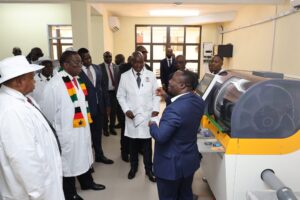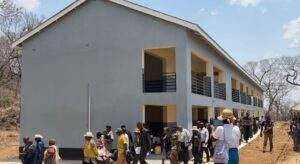VP Chiwenga Lauds Tajikistan’s Rural Industrialisation…
4 min read
…Sees Alignment with Zimbabwe’s Rural Empowerment Drive
Tajikistan – The Honorable Vice President General (Retired) Dr Constantino Chiwenga has expressed profound admiration for Tajikistan’s innovative rural industrialisation programmes, drawing a strong parallel with Zimbabwe’s own ambitious vision to empower its rural communities.
Speaking at a high-level briefing following a recent engagement with Tajikistani officials, VP Chiwenga highlighted the remarkable success of Tajikistan’s initiatives in fostering economic growth, ensuring food security, and unlocking the inherent value within its agricultural sector through strategic industrial development in rural areas.
General Rtd. Dr Chiwenga emphasized that the core principles underpinning Tajikistan’s approach – a focus on value addition to agricultural produce, the creation of local employment opportunities through decentralized industrial activity, and the overall upliftment of rural livelihoods – resonate deeply with Zimbabwe’s ongoing efforts to transform its own rural landscape.
He underscored the alignment between Tajikistan’s achievements and President Emmerson Mnangagwa’s vision of a prosperous and empowered rural economy in Zimbabwe, capable of ensuring national food security and contributing significantly to the nation’s Gross Domestic Product (GDP).
“We have been deeply impressed by the strides Tajikistan has made in transforming its rural areas through well-conceived and effectively implemented industrialisation programmes,” stated Vice President Chiwenga.
“Their model demonstrates a clear pathway towards achieving food security not just through primary agricultural production, but through strategically adding value to that production within the rural communities themselves. This approach not only creates jobs and boosts local economies but also reduces post-harvest losses and enhances the overall sustainability of the agricultural sector.” The Vice President added.
The Vice President elaborated on specific aspects of Tajikistan’s programmes that particularly caught Zimbabwe’s attention.
These include the establishment of small to medium-scale processing plants in rural areas, focusing on key agricultural commodities.
This decentralised approach ensures that the benefits of industrialisation are directly felt by the communities that are the primary producers. Furthermore, Tajikistan’s initiatives have reportedly fostered strong linkages between agricultural production and industrial processing, creating a more integrated and resilient rural economy.
“Their focus on establishing processing facilities for fruits, vegetables, dairy products, and other agricultural outputs directly within the rural areas is a game-changer,” Dr Chiwenga noted.
“This not only creates employment for the local populace but also significantly enhances the value chain, allowing farmers to earn more from their hard work and reducing the reliance on transporting raw materials over long distances, which can often lead to spoilage and reduced profitability.” He remarked.
He further highlighted the role of government support and strategic partnerships in the success of Tajikistan’s rural industrialisation.
This includes the provision of access to finance, technical expertise, and infrastructure development in rural growth points, creating an enabling environment for businesses to thrive.
“What is particularly commendable is the level of government commitment in facilitating this rural industrial transformation,” VP Chiwenga pointed out.
“Their policies appear to actively encourage investment in rural industrial ventures and provide the necessary support systems for these enterprises to succeed. This is a crucial lesson for us as we intensify our own rural empowerment initiatives.” He added.
Zimbabwe has been actively pursuing its own agenda of rural development and agricultural transformation, with a strong emphasis on achieving food self-sufficiency and empowering rural communities.
Initiatives such as the Pfumvudza/Intwasa programme, which promotes climate-smart agriculture at the household level, and efforts to revitalize irrigation schemes are central to this vision.
Vice President Chiwenga’s commendation of Tajikistan’s model suggests a potential for incorporating elements of rural industrialisation to further enhance the impact of these existing programmes.
“Our vision is to see thriving rural communities that are not just producers of raw agricultural materials but are also active participants in the value addition chain,” Dr Chiwenga affirmed.
“The success we have witnessed in Tajikistan provides a compelling case study for how we can unlock the full potential of our agricultural sector and create sustainable economic opportunities for our rural population. By establishing processing industries closer to the source of production, we can create a more resilient and prosperous rural economy.” He implored.
The Vice President indicated that Zimbabwe would be exploring potential avenues for collaboration and knowledge exchange with Tajikistan to learn more about the specifics of their rural industrialisation programmes and identify best practices that could be adapted to the Zimbabwean context.
This could involve exchange visits, technical assistance, and the sharing of policy frameworks and implementation strategies.
“We believe there is significant potential for mutual learning and collaboration between our two nations in this critical area,” Dr Chiwenga stated.
“Understanding the nuances of Tajikistan’s successful implementation can provide valuable insights as we further refine and scale up our own rural empowerment initiatives. Our goal is to create a rural economy that is not only food secure but also a significant contributor to national industrial growth and overall economic prosperity.” The VP added.
The focus on rural industrialisation aligns with the broader national development goals of Zimbabwe, which prioritize economic transformation, job creation, and poverty reduction.
By empowering rural communities and unlocking the value within the agricultural sector, the government aims to create a more balanced and inclusive economic growth trajectory.
Vice President Chiwenga’s remarks underscore the government’s commitment to exploring innovative and proven models from other nations to accelerate Zimbabwe’s development agenda.
The recognition of Tajikistan’s achievements in rural industrialisation signals a potential new dimension to Zimbabwe’s rural empowerment strategy, one that could significantly enhance the livelihoods of millions of Zimbabweans and contribute to the nation’s overall economic resilience.
The coming months are likely to see increased engagement between Zimbabwe and Tajikistan as the country seeks to learn from and potentially adapt the successful strategies that have transformed Tajikistan’s rural landscape.
———————————————
Zim Global Media News 🗞️
an Afrocentric Voice




